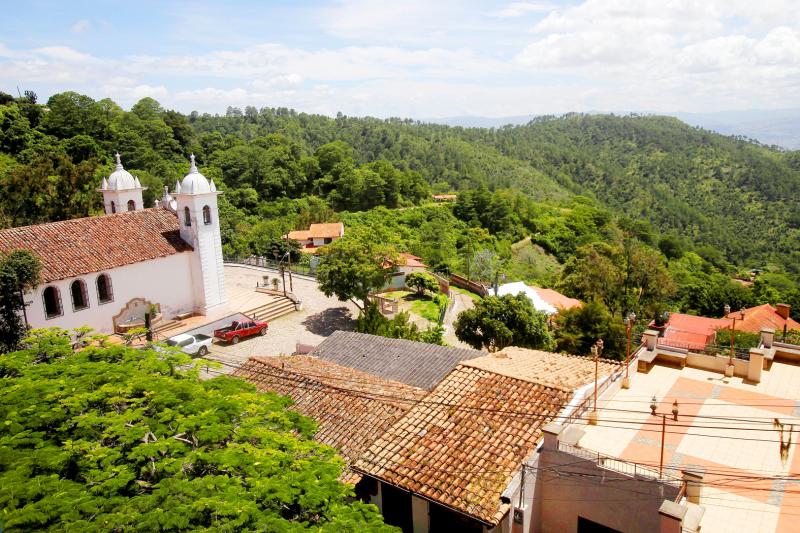People can pay for a slushie with cryptocurrency in the streets of “bitcoin valley,” a project in the Honduran tourist enclave of Santa Lucia, through which the country has entered the digital currency trend.
The small town in the mountains, 20 minutes from the capital, Tegucigalpa, has become a bitcoin city.
Owners of businesses big and small are adapting to handle cryptocurrencies as payment, hoping to attract more tourism.

Photo: Reuters
“It will open more opportunities and attract more people who want to use this currency,” said Cesar Andino, manager of the Los Robles shopping square.
The bitcoin valley project targets 60 businesses to initially get trained and adopt cryptocurrencies to market their products and services, expecting to spread these practices to more enterprises and nearby areas.
The initiative was jointly developed by the Blockchain Honduras organization, Guatemalan cryptocurrency exchange consortium Coincaex, the Technological University of Honduras and the Santa Lucia City Government.
“Santa Lucia’s community will be educated to use and manage cryptocurrencies, implementing them in different businesses in the region and generating cryptotourism,” said Ruben Carbajal Velazquez, a professor at the Technological University.
While some Latin American countries are exploring cryptocurrencies’ potential, there are risks.
In September last year, El Salvador adopted bitcoin as legal tender after introducing its own “bitcoin beach” in the surfing hot spot town of El Zonte.
The Central American country’s bet on bitcoin was hampered by a cryptomarket downturn, and skepticism from multilateral lenders and ratings agencies. Its publicly disclosed holdings of US$105 million are now worth about US$57 million.
To deal with volatility, the bitcoin valley project would “enable merchants to receive instant payments in the local currency, eliminating cryptocurrencies fluctuation risks,” Blockchain Honduras founder Leonardo Paguada said.
Critics of bitcoin’s expansion have warned that these kinds of operations might fuel money laundering and financial instability while enhancing the digital gap, as poorer residents might struggle to access the technology.

NEW IDENTITY: Known for its software, India has expanded into hardware, with its semiconductor industry growing from US$38bn in 2023 to US$45bn to US$50bn India on Saturday inaugurated its first semiconductor assembly and test facility, a milestone in the government’s push to reduce dependence on foreign chipmakers and stake a claim in a sector dominated by China. Indian Prime Minister Narendra Modi opened US firm Micron Technology Inc’s semiconductor assembly, test and packaging unit in his home state of Gujarat, hailing the “dawn of a new era” for India’s technology ambitions. “When young Indians look back in the future, they will see this decade as the turning point in our tech future,” Modi told the event, which was broadcast on his YouTube channel. The plant would convert

‘SEISMIC SHIFT’: The researcher forecast there would be about 1.1 billion mobile shipments this year, down from 1.26 billion the prior year and erasing years of gains The global smartphone market is expected to contract 12.9 percent this year due to the unprecedented memorychip shortage, marking “a crisis like no other,” researcher International Data Corp (IDC) said. The new forecast, a dramatic revision down from earlier estimates, gives the latest accounting of the ongoing memory crunch that is affecting every corner of the electronics industry. The demand for advanced memory to power artificial intelligence (AI) tasks has drained global supply until well into next year and jeopardizes the business model of many smartphone makers. IDC forecast about 1.1 billion mobile shipments this year, down from 1.26 billion the prior

People stand in a Pokemon store in Tokyo on Thursday. One of the world highest-grossing franchises is celebrated its 30th anniversary yesterday.

Zimbabwe’s ban on raw lithium exports is forcing Chinese miners to rethink their strategy, speeding up plans to process the metal locally instead of shipping it to China’s vast rechargeable battery industry. The country is Africa’s largest lithium producer and has one of the world’s largest reserves, according to the US Geological Survey (USGS). Zimbabwe already banned the export of lithium ore in 2022 and last year announced it would halt exports of lithium concentrates from January next year. However, on Wednesday it imposed the ban with immediate effect, leaving unclear what the lithium mining sector would do in the